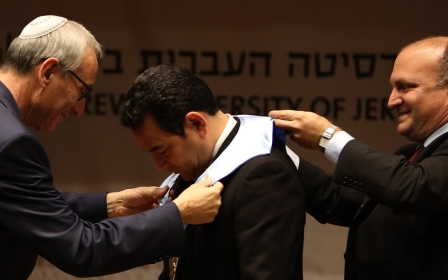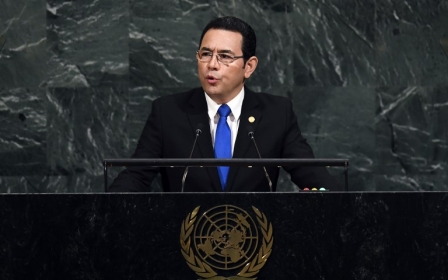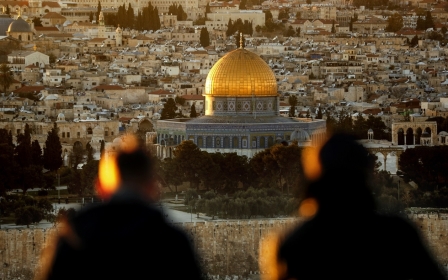Guatemala to move embassy to Jerusalem in May, says president

Guatemala will move its embassy in Israel to Jerusalem from Tel Aviv in May, two days after the US embassy makes the same move, Guatemalan President Jimmy Morales said on Sunday at a conference in Washington.
“I would like to thank President Trump for leading the way. His courageous decision has encouraged us to do what is right,” Morales said in a speech at the American Israel Public Affairs Committee’s annual policy conference, according to a translation of his remarks on the pro-Israel US lobbying group’s website.
Guatemala was one of only a handful of countries that backed US President Donald Trump’s December decision to recognise Jerusalem as the capital of Israel, and it is the first country besides the United States to set a date for moving its embassy there. Trump’s move reversed decades of US policy, upsetting the Arab world and Western allies.
Afterward, 128 countries defied Trump by backing a non-binding UN General Assembly resolution calling for the United States to drop its recognition of Jerusalem.
The status of Jerusalem is one of the thorniest obstacles to forging a peace deal between Israel and the Palestinians, who want East Jerusalem as their capital.
The international community does not recognise Israeli sovereignty over the entire city, home to sites holy to the Muslim, Jewish and Christian religions.
The United States is an important source of assistance to Guatemala, and Trump had threatened to cut off financial aid to countries that supported the UN resolution.
Prior to 1980, Guatemala and a dozen other countries maintained an embassy in Jerusalem. Israel’s passage in June 1980 of a law proclaiming Jerusalem its “indivisible and eternal capital” led to a UN Security Council resolution calling on Guatemala and several other countries to move their embassies to Tel Aviv, prompting their transfer.
Morales said his decision to return the Guatemalan embassy to Jerusalem“strongly evidences Guatemala’s continued support and solidarity with the people of Israel.”
Morales, a former television comedian with an important base of conservative Christian support in the Central American country, became embroiled earlier this year in a dispute with the United Nations when a UN-backed anti-corruption body in Guatemala tried to impeach him.
Although Morales avoided impeachment, he failed in an attempt to expel the head of the body, the International Commission against Impunity in Guatemala, after criticism from the United Nations, the United States and the European Union.
The announcement came a day after Guatemala’s Constitutional Court rejected a local lawyer's attempt to prevent the government from moving its embassy in Israel to Jerusalem.
Spokesman Santiago Palomo told AFP on Saturday that the high court's five magistrates turned down a request from lawyer Marco Vinicio Mejia, who argued in a petition filed in January that the embassy move was contrary to international law.
Guatemala was one of the first countries to recognise Israel when it was founded in 1947 and the two countries have enjoyed strong ties since.
Israel provided arms and military training during the military rule of General Efraín Ríos Montt in the 1980s. Ríos Montt was convicted of genocide and crimes against humanity in 2013 for his part in a lengthy civil war that spanned four decades and left 200,000 indigenous Mayans dead.
After the UN vote in December, Morales stated: “Guatemala is historically pro-Israeli. In 70 years of relations, Israel has been our ally. We have a Christian way of thinking that, as well as the politics of it, has us believing that Israel is our ally and we must support it.”
Middle East Eye propose une couverture et une analyse indépendantes et incomparables du Moyen-Orient, de l’Afrique du Nord et d’autres régions du monde. Pour en savoir plus sur la reprise de ce contenu et les frais qui s’appliquent, veuillez remplir ce formulaire [en anglais]. Pour en savoir plus sur MEE, cliquez ici [en anglais].




